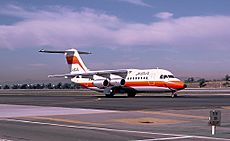Pacific Southwest Airlines Flight 1771 facts for kids

N350PS, the aircraft involved,
at Los Angeles International Airport in 1986 |
|
| Hijacking summary | |
|---|---|
| Date | 7 December 1987 |
| Place | San Luis Obispo County near Cayucos, California, U.S. 35°31′20″N 120°51′25″W / 35.52222°N 120.85694°W |
| Passengers | 38 |
| Crew | 5 |
| Fatalities | 43 |
| Survivors | 0 |
| Aircraft type | British Aerospace 146-200A |
| Aircraft name | The Smile of Stockton |
| Airline/user | Pacific Southwest Airlines |
| Registration | N350PS |
| Flew from | Los Angeles International Airport, California, U.S. |
| Flying to | San Francisco International Airport, California, U.S. |
Pacific Southwest Airlines Flight 1771 was a plane that crashed on December 7, 1987. It was flying from Los Angeles to San Francisco in California. The plane crashed after a passenger took control of it. All 43 people on board, including passengers and crew, sadly died.
Contents
What Happened?
This flight was a regular trip along the West Coast of the United States. The plane was a British Aerospace 146-200A. On December 7, 1987, it crashed in San Luis Obispo County, California. This happened because a passenger hijacked the plane.
All 43 people on the plane died. This included 38 passengers and 5 crew members. Five people, including the two pilots, were shot before the plane crashed.
Why It Happened
The person who hijacked the plane was David Burke. He used to work for US Airways, which owned Pacific Southwest Airlines. Burke had been fired from his job as a ticketing agent. He was let go for taking $69 from the money collected for drinks on flights.
Burke tried to get his job back by meeting with his manager, Ray Thomson. But he was not rehired. After this, Burke bought a ticket for PSA Flight 1771. His former manager, Ray Thomson, was also on this flight. Thomson often took this flight to go home to the San Francisco Bay Area after work.
How Burke Got on the Plane
Burke still had his old USAir employee ID. This allowed him to avoid the regular security checks at Los Angeles International Airport (LAX). He also had a powerful gun, a .44 Magnum revolver, which he had borrowed from a coworker.
Burke got onto the plane through a special door meant for the crew. He found the code to open this locked door.
The Note
Once on the plane, Burke wrote a message on an airsickness bag. It is not known if he gave this note to Thomson before shooting him. The note said:
Hi Ray. I think it's sort of ironical that we end up like this. I asked for some leniency for my family. Remember? Well, I got none and you'll get none.
After the Crash
After this terrible event, new laws were made to make air travel safer. One important law said that all airline and airport employee IDs must be taken back immediately when someone leaves their job. Another new rule made sure that all airline crew and airport workers had to go through the same security checks as passengers.
Several important people were on the flight and died. This included the president of Chevron USA and three other executives from the company. Three officials from Pacific Bell also died. Because of this, many large companies started rules to stop several of their top leaders from flying on the same plane.
Remembering the Flight
In a place called the "Garden of Hope" in Los Osos, California, there is a special marker. It is made of granite and bronze and honors the 42 victims of Flight 1771. Many of the passengers and crew are buried in that cemetery.
On TV
The story of Flight 1771 and the investigation was shown on TV.
- An episode of the Canadian TV show Mayday (also known as "Air Crash Investigation") was called "I'm the Problem" (or "Murder on Board" in the UK).
- Flight 1771 was also shown in a TV series called Aircrash Confidential.
See also
 In Spanish: Vuelo 1771 de Pacific Southwest Airlines para niños
In Spanish: Vuelo 1771 de Pacific Southwest Airlines para niños
 | Kyle Baker |
 | Joseph Yoakum |
 | Laura Wheeler Waring |
 | Henry Ossawa Tanner |

